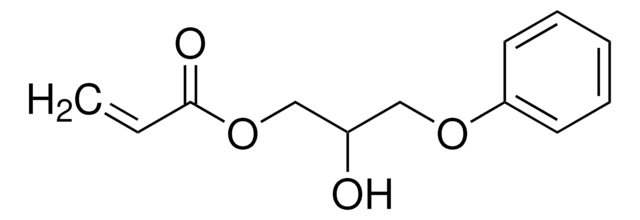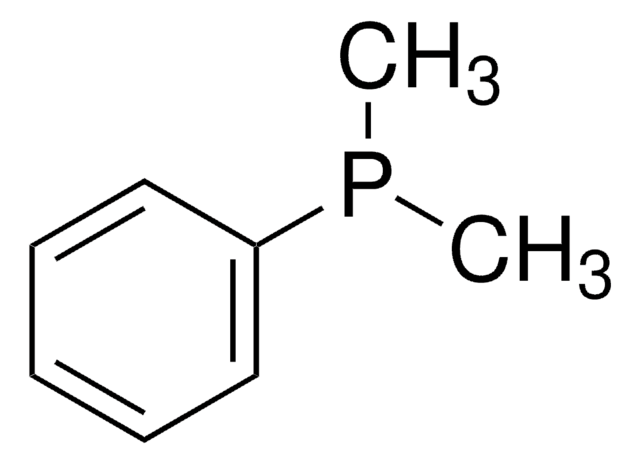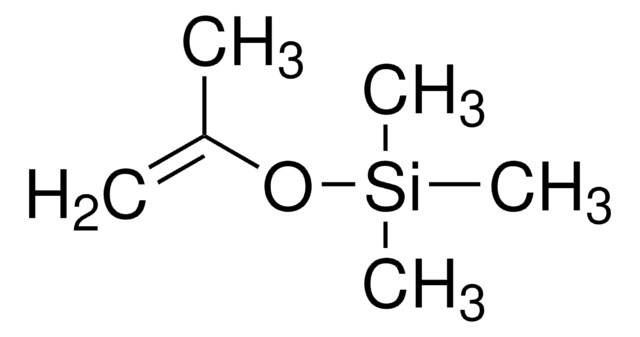454982
3-(Acryloyloxy)-2-hydroxypropyl methacrylate
Synonym(s):
1-(Acryloyloxy)-2-hydroxy-3-(methacryloyloxy)propane, 2-Hydroxy-1-acryloxy-3-methacryloxypropane, 2-Hydroxy-1-acryloyloxy-3-methacryloyloxypropane, 3-Acryloyloxy glycerol monomethacrylate
About This Item
Recommended Products
contains
200 ppm monomethyl ether hydroquinone as inhibitor
350 ppm BHT as inhibitor
Quality Level
refractive index
n20/D 1.473 (lit.)
density
1.14 g/mL at 25 °C (lit.)
storage temp.
2-8°C
SMILES string
CC(=C)C(=O)OCC(O)COC(=O)C=C
InChI
1S/C10H14O5/c1-4-9(12)14-5-8(11)6-15-10(13)7(2)3/h4,8,11H,1-2,5-6H2,3H3
InChI key
ZODNDDPVCIAZIQ-UHFFFAOYSA-N
Application
- Spectroscopic Analysis on Michael Addition Reaction of Secondary Amino Groups on Silica Surface with 3-(Acryloyloxy)-2-hydroxypropyl Methacrylate: This study discusses the introduction of polymerizable methacrylate groups to silica surfaces via Michael addition of AHM, observing increased functional group introduction with increased molar ratios (S Lee, KR Ha, 2014).
- Synthesis of well-defined diblock copolymer nano-objects by RAFT non-aqueous emulsion polymerization: The paper elaborates on the synthesis of well-defined polymeric nano-objects employing RAFT polymerization in non-aqueous media, highlighting the versatility of methacrylate copolymers in creating tailored nanostructures (RR Gibson, A Fernyhough, OM Musa, SP Armes, 2021).
- Spectroscopic analysis of methacrylate groups introduced on silica particle surfaces by the aza-Michael addition reaction: This publication explores the functionalization of silica particles with methacrylate groups using AHM, focusing on the efficiency of grafting via spectroscopic analysis (S Lee, KR Ha, 2016).
- Antimicrobial and Responsive Zwitterionic Polymer Based on Cysteine Methacrylate Synthesized via RAFT Polymerization: Discusses the synthesis of a responsive, antimicrobial zwitterionic polymer from cysteine and AHM, using thiol-Michael reaction for antimicrobial applications (P Yadav, S Hafeez, J Jaishankar, P Srivastava, 2021).
Signal Word
Danger
Hazard Statements
Precautionary Statements
Hazard Classifications
Eye Dam. 1 - Skin Irrit. 2 - Skin Sens. 1
Storage Class Code
10 - Combustible liquids
WGK
WGK 3
Flash Point(F)
235.4 °F - closed cup
Flash Point(C)
113 °C - closed cup
Personal Protective Equipment
Regulatory Listings
Regulatory Listings are mainly provided for chemical products. Only limited information can be provided here for non-chemical products. No entry means none of the components are listed. It is the user’s obligation to ensure the safe and legal use of the product.
FSL
Group 4: Flammable liquids
Type 3 petroleums
Hazardous rank III
Water insoluble liquid
JAN Code
454982-VAR:
454982-100ML:
454982-500ML:
454982-BULK:
Choose from one of the most recent versions:
Already Own This Product?
Find documentation for the products that you have recently purchased in the Document Library.
Customers Also Viewed
Our team of scientists has experience in all areas of research including Life Science, Material Science, Chemical Synthesis, Chromatography, Analytical and many others.
Contact Technical Service



![[3-(Diethylamino)propyl]trimethoxysilane 96%](/deepweb/assets/sigmaaldrich/product/structures/369/056/3e3cd51a-0662-4e06-a10a-866ae1d6c290/640/3e3cd51a-0662-4e06-a10a-866ae1d6c290.png)









